The institution provides a variety of specialized physical facilities for interdisciplinary research teams across relevant fields, including Learning Centers and Laboratories, Field Research Center, Wanagama Nusantara, Wanagama I Gunungkidul, Center for Agrotechnology Innovation (Pusat Inovasi Agroteknologi, PIAT), Science Techno Park (STP), and Study Centers.
Learning Center
According to the Rector’s Regulation on Laboratory Management, Article 17, UGM manages Learning Centers to strengthen education, research and development, community service, and collaboration with industry. These centers serve as facilities for multidisciplinary, interdisciplinary, and transdisciplinary research groups engaged in the advancement of science, technology, and the arts. There are ten learning centers operated:
- Smart and Green Learning Center (SGLC)
- Engineering Research Innovation Center (ERIC)
- Law Learning Center (LLC)
- Animal Science Learning Center (ASLC)
- Integrated Forest Farming Learning Center (IFFLC)
- Agrotropical Learning Center (AGLC)
- Dental Learning Center (DLC)
- Advanced Pharmaceutical Science Learning Center (APSLC)
- Teaching Industry Learning Center (TILC)
- Field Research Center (FRC)
To ensure effective management, UGM has established a Laboratory Management Team under the coordination of the Integrated Laboratory Management System, which includes the Task Force for Laboratory System Integration and Learning Center Coordinators. In addition, faculties and schools assign Vice Deans responsible for research and/or community service to assist in coordinating Learning Center activities. UGM has also developed an integrated facility management system to optimize the use of Learning Centers.
Integrated Research and Testing Laboratory (Laboratorium Penelitian dan Pengujian Terpadu, LPPT)
The Integrated Research and Testing Laboratory (LPPT) provides various laboratory facilities for undergraduate, master’s, and doctoral students, as well as researchers at UGM. LPPT offers a range of testing services in physics, chemistry, and biology, along with calibration services for industries, state-owned enterprises (BUMN), government institutions, and universities. The calibration services cover temperature, mass/weight, analytical instruments, and pressure. Additionally, LPPT provides preclinical testing services using laboratory animals, such as rats and mice. To support research quality and laboratory management, LPPT also conducts training programs on ISO management systems, as well as technical training on laboratory analysis and equipment usage.
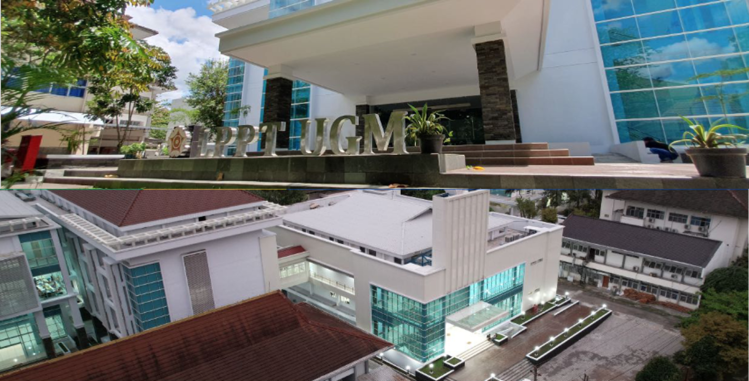
Booklet Profile Integrated Research and Testing Laboratory (LPPT): Integrated Research and Testing Laboratory (LPPT) Profile Booklet.pdf
Field Research Center (FRC)
The Field Research Center (FRC) is one of UGM’s Centers of Excellence (CoE) satellites, located in Kulon Progo, Yogyakarta Special Region (DIY). FRC is designed as a collaborative research and development facility, fostering advanced partnerships between academia, industry, government, and the community. Local commodities are developed and enhanced through collaborative research initiatives, benefiting the local community. Additionally, FRC contributes to the regional development of Kulon Progo through community engagement, education, and scientific advancements. One notable initiative includes the application of greenhouse technology, in collaboration with the Department of Agriculture and Food of Kulon Progo Regency. This partnership is formalized through a Cooperation Agreement (PKS) on the Utilization of FRC, representing UGM’s commitment to supporting the Kulon Progo local government. FRC integrates a teaching industry approach through the implementation of a “link and match” strategy, ensuring the alignment of academic research with industry needs. The teaching industries at FRC include: CoE Wood Pellet, CoE Cacao, CoE Dairy Milk, CoE Fab Lab and Medical Device. FRC’s facilities are utilized for various research and production activities, including cacao production, Fab Lab and Medical Devices, Dairy Milk Processing, Product Analysis and Quality Control Room, and Incubation and Design Room. These initiatives reinforce UGM’s role in fostering regional economic development, technological innovation, and interdisciplinary research collaborations.
Wanagama Nusantara
Wanagama Nusantara is a forest research and education ecosystem initiated by Universitas Gadjah Mada (UGM) in collaboration with the IKN Authority and the Ministry of Environment and Forestry. Covering approximately 621 hectares, Wanagama Nusantara supports IKN’s vision as a Forest City. It is expected to serve as a window of the tropical world, representing Indonesia’s global commitment to climate change mitigation and adaptation while reflecting the country’s local knowledge and wisdom. The development of Wanagama Nusantara aims to establish an ecosystem for tropical rainforest restoration and to create a research hub that addresses global challenges in tropical health, biodiversity and forest restoration, renewable energy, green infrastructure, and policy governance.
The research collaboration between IKN and Wanagama Nusantara seeks to activate scientific activities in Nusantara by utilizing Wanagama Nusantara’s facilities at IKN and involving students in research. A key goal is the establishment of the Wanagama Nusantara Research Hub at IKN, which will serve as a platform for disseminating research outcomes, strengthening collaborative networks, and enhancing community engagement and policy recognition within IKN.
Wanagama Nusantara’s main programs are divided into three areas: the development of educational forest zoning, the establishment of the Institute for Future Life, and initiatives in restoration, reforestation, and enrichment planting. For educational forest zoning, Wanagama Nusantara consists of eight designated zones: the Conservation Zone, Healing Forest Zone, Ecotourism Zone, Agroforestry Zone, Eco-Edu Forestry Zone, Herbal Medicine Zone, Tropical Rainforest Miniature Zone, and Global Forest Zone.Another key program within Wanagama Nusantara is the development of the Institute for Future Life (IFL). Designed as an educational and research facility, IFL will function as a multidisciplinary research center integrated with the smart and green building concept. It is also envisioned as a hub for international research collaboration, supporting UGM’s commitment to sustainable development and scientific innovation.
Wanagama I Gunungkidul
UGM rehabilitated critical land in Gunungkidul, known as the Wanagama Eco-Edu Forest. The status of this forest for conservation and rehabilitation of this area is stated in the Decree of the Indonesian Minister of Environment and Forestry Number 493/Menlhk-Setjen/2015. The Wanagama Eco-Edu Forest is one of the forest areas out of the total amount of 622,25 hectares of forest areas owned by UGM.
Wanagama is a unique ecosystem. Wanagama has various forms of topography, rock layers, soil types, hydrological systems, microclimates, plants, animals, test planting plots, and socio-economic interactions with the surrounding community. Based on this potential, Wanagama can function as:
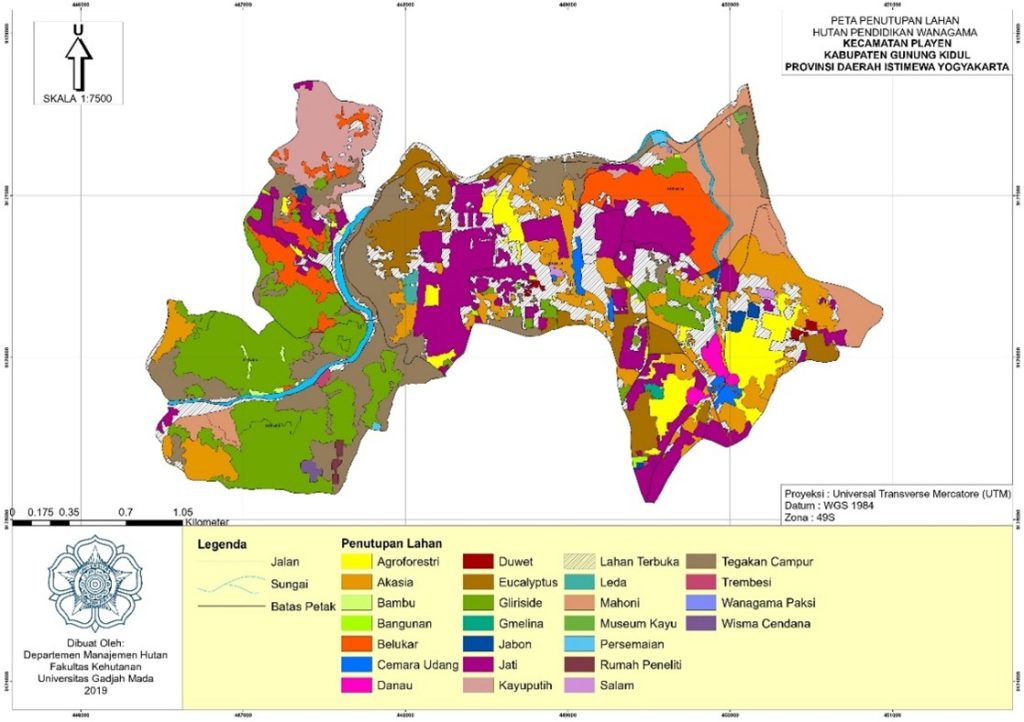
- Environmental education center: Environmental education that is open to the wider community, educational institutions, nature lovers, environmental observers, government institutions, and private companies both from within and outside the country
- Science Park: A science park with competent speakers and natural resources for research materials, training and knowledge. Starting from plants, animals, soil, earth rocks, society, and places for practice in the open air
- Nature tourism: Beautiful natural nuances and water sources equipped with camping facilities, walking, tracking, jogging, cycling, lodging, courtrooms, joglo, halls, multipurpose rooms, canteens, and parking areas
- Convention forest: A forest that provides materials and facilities to support workshops, work meetings, reunions and relaxing with family.
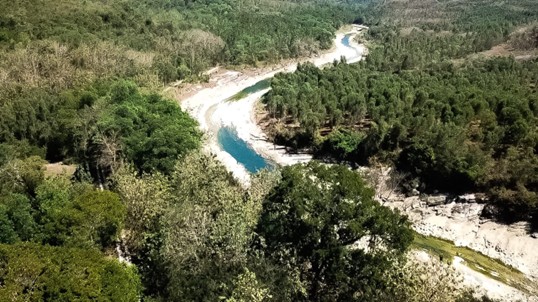
Wanagama has produced 5 studies per year over 41 years. The forms of research vary, especially in books which are divided into textbooks, references, research reports, and seminar proceedings. The topics that are frequently raised are forest soils, plant growth, forest litter, genetic testing, and plant health. Researchers come from the Faculty of Biology, Agriculture, and Geography at UGM, as well as other researchers from outside UGM.
Center for Agrotechnology Innovation (Pusat Inovasi dan Agroteknologi, PIAT)
The Center for Agrotechnology Innovation (PIAT) is a field laboratory that is used to carry out educational, research, and community service activities which are tri dharma services based on integrated agriculture.
- The PIAT function is to carry out research education services and community in the field of integrated agricultural innovation that is environmentally friendly.
- Implementing in realizing the development of innovation in the field of agrotechnology to become the center of superior integrated tropical agriculture.
- Coordination of the implementation of innovative technologies that can be directly utilized by the community, government, private sector, and academia in accordance with the university’s flagship research.
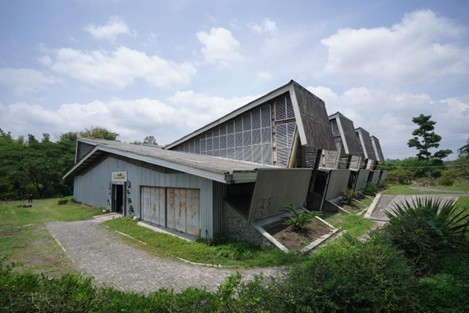
PIAT is the answer to Universitas Gadjah Mada (UGM) in facing the era of the ASEAN Economic Community (MEA) in 2015. PIAT is actively laying a systematic and integrated foundation in realizing the independence of the agro sector as a pillar of the national economy, namely becoming a producer of agricultural commodities which reliable and sovereign. By emphasizing the element of innovation, PIAT utilizes UGM’s land resources from supporting agro-research to become a productive unit that capable to produce innovative agro products. Currently, PIAT UGM has a 35 Ha garden in Kalitirto Berbah Sleman and 151 Ha in Mangunan Imogiri Bantul, which consists of eight (8) leading fields that are implemented, namely;
- Genetic Bank and Seed Production
- Organic and Smart Farming
- Zero Waste Sustainable Fisheries
- Smart Livestock
- Plantation and Bio Pharmacy
- Agro Processing Unit
- Waste Management Technology
- Agroedutainment
Science Techno Park (STP)
Science Techno Park UGM (STP-UGM) is a productive platform based on interdisciplinary research and innovation, designed to support learning processes in synergy with industry and government. STP UGM is developed as a connected zone that integrates university-based interdisciplinary research and innovation centers, training and entrepreneurship hubs, business incubation facilities for startups, industrial sectors, banking institutions, as well as central and regional governments. This integration facilitates the effective and efficient flow of information, technology, and services. STP-UGM focuses on overseeing 5 downstream sectors, namely 1) Health and pharmaceutical sector, 2) Agro-industry sector, 3) Renewable energy sector.
The development of interdisciplinary research-based enterprises aims to enhance product innovation that is practical, responsive to societal needs, and contributes to overall well-being. Additionally, it seeks to optimize existing community resources, reduce dependence on imported products, and foster sustainable economic growth. These objectives align with the central and regional governments’ initiatives to accelerate societal welfare through job creation and human resource development.
STP UGM Profile: About UGM Science Technopark.pdf
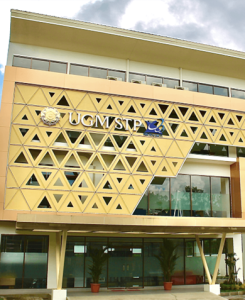
Study Centers
To enhance the quality of services and facilities in research units such as Study Centers, an integrated management system is essential. Therefore, the centralization of Study Centers is a program that must be realized. As part of the development of the campus area philosophy, the currently dispersed Study Centers will be centralized into three zones based on their respective scientific foundations: (1) Study Centers based on science and technology (IPTEK), (2) Study Centers based on UGM values and internationalization, and (3) Study Centers focused on environmental and disaster studies.
The zoning process has been gradually implemented since 2023, with the following developments:
- Phase 1 of the zoning initiative in the PAU area of Universitas Gadjah Mada is being carried out in 2024, involving the consolidation of six Study Centers within a single area, along with the implementation of an integrated human resources management system and a unified administrative management system.
- Phase 2 of the PAU area zoning is scheduled for 2025.
- Additionally, zoning will be extended to the Kuningan area.
UGM has several research institutes offering strategic research topics and offers outstanding collaboration potential for researchers.
- Center For Population and Policy Studies: The center has actively developed population and policy studies through various activities, including research, education, training, support services, and advocacy. Over the last ten years, CPPS UGM has conducted more than a hundred studies and capacity building programs with diverse themes, including poverty, population and demographic, health and education, good governance, decentralization and public service, gender and reproductive health, and migration.
- Center for Asia Pasific Studies: The center produces research on social, political, cultural, economic and other issues related to Asia- Pacific region, in order to provide important recommendations to the stakeholders.
- Center for Biological Resources Studies: The center focuses on increasing advocacy and assistance to communities experiencing problems with the conservation, utilization and management of biological resources with interdisciplinary cooperation that is synergistic, effective and efficient in sustainable management of biological resources.
- Center for Biotechnology Studies: The center focuses on developing biotechnology in Indonesia through research, seminars, workshops, research internships, short courses, and assigning lecturers to various universities abroad for doctoral and master programs.
- Center for Cultural Studies: The center focuses on conducting research, education and training, consultations and publications related to cultural policy and the implementation of cultural perspectives in various areas of life.
- Center for Disaster Studies: The center focuses on conducting disaster research to contribute ideas related to disaster management in order to support various educational activities and community service.
- Center for Economic Democracy Studies: The Center focuses on conducting research related to the development of a populist economic system in various places in Indonesia. Research priorities include regional autonomy, village empowerment and poverty alleviation (according to typology: agricultural village, tourist village, forest village, coastal village, etc.), People’s Market Development, Renewable Energy Development, Empowerment of Cooperatives and SMEs, Employment.
- Center for Economic and Public Policy Studies: The center focuses on basic and policy oriented researches as well as applied researches in public, economic and taxpolicies.Center for Energy Studies
- Center for Energy Studies: The center focuses on an intern-disciplinary energy study-research activity on green energy (fossil-based and renewable energies). It offers comprehensive solution to develop and implement the smart energy policy and technologies in the frame of engineering & scientific solutions, social, political and economic areas.
- Center for Environmental Studies: The center focuses on conducting a range of basic and applied research activities in the environmental field (strategic environmental assessment, environmental carrying capacity research, environmental information systems, environmental audits, and others).
- Center for Food and Nutrition Studies: The center focuses on promoting research and education in the field of food science and nutrition as well as community development.
- Center for Marine Resources and Technology Studies: The center focuses on conducting various activities in the field of marine and fisheries, in accordance with its core competence and human resources.
- Center for Pancasila Studies: The center focuses on developing Pancasila through a multidisciplinary approach to solve problems in the life of society, nation and state through research, training, advocacy, discussion and publications.
- Center for Regional Development Planning Studies: The center focuses in research, consultancy, and capacity building in regional and urban planning development.
- Center for Rural and Regional Development Studies: The center focuses on conducting researches and studies on rural and regional development, food security and food sovereignty, poverty, justice, and CSR program evaluation and planning.
- Center for Security and Peace Studies: The center has a strong commitment to facilitation, training and mentoring actions as its community service in the transformation of development. There are three main issues that serve as the framework: Security Sector Reform, Conflict Resolution, and Peace.
- Center for South East Asia Social Studies: The center focuses on producing high quality multi-disciplinary research focusing on Southeast Asia, providing basic information for policy recommendation and enhancing awareness of the society towards the studies of Southeast Asia, establishing sustainable partnership with other research centers that focus on Southeast Asian studies from all around the world.
- Center for Tourism Studies: The Center has the competence of research, planning and design, training, monitoring on tourism as the basis for formulating tourism development policy.
- Center for Transportation and Logistics Studies: The center focuses on encouraging changes with innovative ideas for the advancement and development of the transport and logistics sectors to solve local, national, and international problems.
- Center for Women Studies: The center focuses on responding to gender and child issues, upholding women’s and men’s rights to opportunity, recognition, respect, and access to equal services in the community so as to achieve gender equality and justice.
- Center for World Trade Studies: The center focuses on conducting a critical assessment of the various dynamics of global commerce to provide input and recommendations for governments, communities and parties preparing for and anticipating problems, challenges and opportunities in world trade.
References:
- Rector’s Regulation on Laboratory Management, Article 17
- Integrated Research and Testing Laboratory (Laboratorium Penelitian dan Pengujian Terpadu, LPPT)
- Field Research Center (FRC)
- Wanagama Nusantara
- Wanagama I Gunungkidul
- Center for Agrotechnology Innovation (PIAT)
- Science Techno Park UGM (STP-UGM)
- Study Centers
